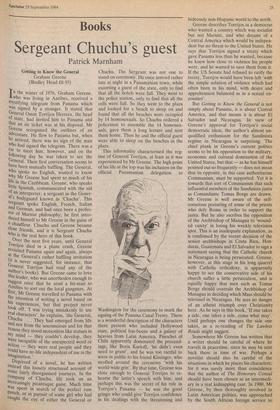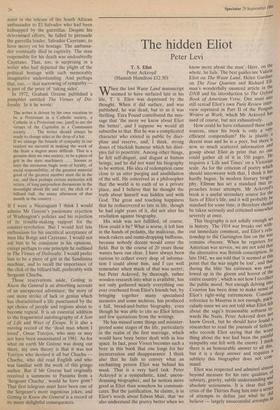Books
Sergeant Chuchu's guest
Patrick Marnham
Getting to Know the General Graham Greene (Bodley Head £8.95)
In the winter of 1976, Graham Greene, who was living in Antibes, received a mystifying telegram from Panama which was signed by a stranger. It stated that General Omar Torrijos Herrera, the head of state, had invited him to Panama and that an air ticket was at his disposal. Mr Greene recognised the outlines of an adventure. He flew to Panama but, when he arrived, there was no sign of the man who had signed the telegram. There was a car to meet him, however, and on the following day he was taken to see the General. Their first conversation seems to have been mutually baffling. The General, who spoke no English, wanted to know !illy Mr Greene had spent so much of his life in the Caribbean. Greene, who speaks little Spanish, communicated with the aid of an interpreter, a sergeant in the Gener- al's bodyguard known as `Chuchu'. This sergeant spoke English, French, Italian and German, and had once been a profes- sor of Marxist philosophy; he first intro- duced himself to Mr Greene in the guise of a chauffeur. Chuchu and Greene became close friends, and it is Sergeant Chuchu who is the real hero of this book.
Over the next five years, until General Torrijos died in a plane crash, Greene revisited Panama again and again, always at the General's rather baffling invitation (it is never suggested, for instance, that General Torrijos had read any of the author's books). But Greene came to love this leader, who was unorthodox enough to suggest once that he send a hit-man to Antibes to sort out the local gangsters. At first, Mr Greene travelled to Panama with the intention of writing a novel .based on his experiences, but that project never took off. 'I was trying mistakenly to use real characters', he explains, 'the General, Chuchu . . . They had emerged from life and not from the unconscious and for that reason they stood motionless like statues in my mind — they couldn't develop, they were incapable of the unexpected word or action — they were real people and they could have no life independent of me in the imagination.' Deprived of a novel, he has written instead this loosely structured account of some fairly disorganised journeys. In -the company of Chuchu, life took on an increasingly picaresque guise. Much time was spent in search of the perfect rum Punch, or in pursuit of some girl who had Caught the eye of either the General or Chuchu. The Sergeant was not one to stand on ceremony. He once arrived rather late at night in a Panamanian town, while escorting a guest of the state, only to find that all the hotels were full. They went to the police station, only to find that all the cells were full. So they went to the plaza and looked for a bench to sleep on and found that all the benches were occupied by 14 homosexuals. So Chuchu ordered a policeman to assemble the 14 homosex- uals, gave them a long lecture and sent them home. Then he and the official guest were able to sleep on the benches in the plaza.
This informality characterised the reg- ime of General Torrijos, at least as it was experienced by Mr Greene. The high point of his life at the top was his inclusion on the official. Panamanian delegation to Washington for the ceremony to mark the signing of the Panama Canal Treaty. There is a wonderful description of the characters there present who included Hollywood stars, political has-beens and a galaxy of heavies from Latin America. Pinochet of Chile apparently dominated the proceed- ings; like Boris Karloff, 'he didn't even need to grunt', and he was too tactful to • wave in public to his friend Kissinger, who strolled around the ceremony 'with his world-wide grin'. By that time, Greene was close enough to General Torrijos to re- hearse the latter's speech with him; and perhaps this was the secret of his role in Torrijos's Panama — he was the good gringo who could give Torrijos confidence in his dealings with the threatening and hideously non-Hispanic world to the north.
Greene describes Torrijos as a democrat who wanted a country which was socialist but not Marxist, and who dreamt of a Central America which would be indepen- dent but no threat to the United States. He says that Torrijos signed a treaty which gave Panama less than he wanted, because he knew how close to violence his people were, and he wanted to save them from it.
If the US Senate had refused to ratify the treaty, Torrijos would have been left 'with the simple solution of violence which had often been in his mind, with desire and apprehension balanced as in a sexual en- counter'.
But Getting to Know the General is not simply about Panama, it is about Central America, and that means it is about El Salvador and Nicaragua. In view of Greene's approval for Torrijos's social democratic ideas, the author's almost un- qualified enthusiasm for the Sandinista regime in Nicaragua is surprising. The chief plank in Greene's current politics seems to be his opposition to the military, economic and cultural domination of the United States, but that — as he has himself pointed out so frequently — does not mean that its opposite, in this case authoritarian Communism, must be supported. Yet it is towards that sort of Communism that such influential members of the Sandinista junta as Comandante Tomas Borge are drawn.
Mr Greene is well aware of the self- conscious posturing of some of the priests who defy Rome in order to support the junta. But he also ascribes the opposition of the Archbishop of Managua to 'wound- ed vanity' in losing his weekly television spot. This is an inadequate explanation, as is confirmed by the recent decision of the senior archbishops in Costa Rica, Hon- duras, Guatemala and El Salvador to sign a statement saying that the Catholic church in Nicaragua is being persecuted. Greene, however, at this stage in his long quarrel with Catholic orthodoxy, is apparently happy to see the conservative side of his church suffer a little persecution, and is equally happy that men such as Tomas Borge should overrule the Archbishop of Managua in deciding which Mass should be televised in Nicaragua. He sees no danger of an atheist triumph over Christianity here. As he says in this book, 'If one takes a side, one takes a side, come what may'.
Until perhaps one changes the side one takes, as a re-reading of The Lawless Roads might suggest.
Somewhere Mr Greene has written that a writer should be careful of where he travels in peacetime, since he may be sent back there in time of war. Perhaps a novelist should also be careful of the situations in which he places his characters; for it was surely more than coincidence that the author of The Honorary Consul should have been chosen as an intermedi- ary in a real kidnapping case. In 1980, Mr Greene, by then thoroughly involved in Latin American politics, was approached by the South African foreign service to
assist in the release of the South African ambassador to El Salvador who had been kidnapped by the guerrillas. Despite his determined efforts, he failed to persuade the guerrilla leader, Salvador Cayetano, to have mercy on his hostage. The ambassa- dor eventually died in captivity. The man responsible for his death was undoubtedly Cayetano. That, too, is surprising in a writer who had depicted the plight of the political hostage with such memorably imaginative understanding. And perhaps that, too, — that narrowing of sympathy is part of the price of `taking.sides'.
In 1972, Graham Greene published a pamphlet entitled The Virtues of Dis- loyalty. In it he wrote:
The writer is driven by his own vocation to be a Protestant in a Catholic society, a Catholic in a Protestant one, [and] to see the virtues of the Capitalist in a Communist society . . . The writer should always be ready to change sides at the drop of a hat . . . If we enlarge the bounds of sympathy in our readers we succeed in making the work of the State a degree more difficult. That is a genuine duty we owe society, to be a piece of grit in the state machinery . . . Sooner or later the strenuous bugle note of loyalty, of social responsibility, of the greatest material good of the greatest number must die in the ear, and then perhaps certain memories will return, of long purposeless discussions in the moonlight about life and art, the click of a billiard ball, the sunny afternoon of that month in the country . . .
If I were a Nicaraguan I think I would admire Mr Greene's passionate rejection of Washington's policies and his rejection of its trouble-making support for the counter-revolution. But I would feel less enthusiasm for his uncritical acceptance of men like Borge and Cayetano. I would not ask him to he consistent in his opinions, except perhaps to one principle he outlined in The Virtues of Disloyalty. I would prefer him to be a piece of grit in the Sandinista machine, and to recall the importance of the click of the billiard ball, preferably with Sergeant Chuchu.
Those reservations aside, Getting to Know the General is an absorbing account of an unexpected adventure; the story of one more stroke of luck or genius which has characterised a life punctuated by the apt choice of people and regions about to become topical. It is an essential addition to the fragmented autobiography of A Sort of Life and Ways of Escape. It is also a moving record of the 'dead man whom I loved', Omar Torrijos, who may or may not have been assassinated in 1981. As for what on earth Mr Greene was doing out there, my own theory is that it was not Torrijos who devised it all but Chuchu Chuchu, who did read English and who was familiar with the work of this. gringo author. But if Mr Greene had originally received a summons to Panama from a `Sergeant Chuchu', would he have gone? That first telegram must have been one of the Sergeant's more ingenious jokes; and Getting to Know the General is a record of its many delightful consequences.















































 Previous page
Previous page